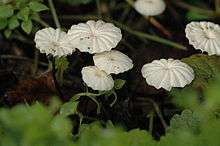Marasmiaceae
The Marasmiaceae are a family of basidiomycete fungi which have white spores. They mostly have tough stems and the capability of shrivelling up during a dry period and later recovering. The widely consumed edible fungus Lentinula edodes, the shiitake mushroom, is a member of this family. According to a 2008 estimate, the family contains 54 genera and 1590 species.[2]
| Marasmiaceae | |
|---|---|
 | |
| Marasmius rotula | |
| Scientific classification | |
| Kingdom: | Fungi |
| Division: | Basidiomycota |
| Class: | Agaricomycetes |
| Order: | Agaricales |
| Family: | Marasmiaceae Roze ex Kühner (1980) |
| Type genus | |
| Marasmius Fr. (1835) | |
| Diversity | |
| Over 50 genera, 1500+ species. | |
| Synonyms[1] | |
|
Omphalotaceae Bresinsky 1985 | |
The family Omphalotaceae, described by A. Bresinsky in 1985[3] as a segregate from the Tricholomataceae, has been considered synonymous with Marasmiaceae.[1] However DNA analysis by Moncalvo et al. in 2002 and Matheny et al. in 2006 have now led to that family being accepted by Index Fungorum and most recent references. The following genera are included in that family : Anthracophyllum, Gymnopus, Lentinula, Marasmiellus, Mycetinis, Rhodocollybia, Omphalotus.[4][5][6][7]
Genera
See also
References
- Kirk et al. 2008, p. 481
- Kirk et al. 2008, p. 401
- Kämmerer, A.; Besl, H.; Bresinsky, A. (1985). "Omphalotaceae fam. nov. und Paxillaceae, ein chemotaxonomischer Vergleich zwier Pilzfamilien der Boletales". Pl. Syst. Evol. 150 (1–2): 101–117. doi:10.1007/BF00985571.
- Moncalvo JM1, Vilgalys R, Redhead SA, Johnson JE, James TY, Catherine Aime M, Hofstetter V, Verduin SJ, Larsson E, Baroni TJ, Greg Thorn R, Jacobsson S, Clémençon H, Miller OK Jr. (2002). "One hundred and seventeen clades of euagarics". Molecular Phylogenetics and Evolution. 23 (3): 357–400. doi:10.1016/s1055-7903(02)00027-1. PMID 12099793. Retrieved 2018-06-11.CS1 maint: uses authors parameter (link)
- Matheny PB1, Curtis JM, Hofstetter V, Aime MC, Moncalvo JM, Ge ZW, Slot JC, Ammirati JF, Baroni TJ, Bougher NL, Hughes KW, Lodge DJ, Kerrigan RW, Seidl MT, Aanen DK, DeNitis M, Daniele GM, Desjardin DE, Kropp BR, Norvell LL, Parker A, Vellinga EC, Vilgalys R, Hibbett DS (2006). "Major clades of Agaricales: a multilocus phylogenetic overview". Mycologia. 98 (6): 982–995. doi:10.3852/mycologia.98.6.982. PMID 17486974.CS1 maint: uses authors parameter (link)
- Antonín, V.; Noordeloos, M. E. (2010). A monograph of marasmioid and collybioid fungi in Europe. Postfach 1119, 83471 Berchtesgaden, Germany: IHW Verlag. pp. 395–396. ISBN 978-3-930167-72-2.CS1 maint: location (link)
- For example, see the Species Fungorum page for genus Mycetinis: "Mycetinis page". Species Fungorum. Royal Botanic Gardens Kew. Retrieved 2017-05-23.
- Kirk, P.M.; Cannon, P.F.; Minter, D.W; Stalpers, J.A. (2008). Dictionary of the Fungi (10th ed.). Wallingford: CABI. ISBN 978-0-85199-826-8.CS1 maint: ref=harv (link)
